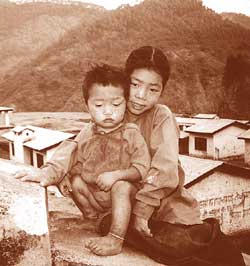 According to a recent study, during the last six years, 162 children were killed and around 300 injured in the war between the Maoist rebels and the security forces, while hundreds of displaced children face abuse and exploitation.
According to a recent study, during the last six years, 162 children were killed and around 300 injured in the war between the Maoist rebels and the security forces, while hundreds of displaced children face abuse and exploitation. Child Workers in Nepal Concerned Center (CWIN), which conducted the study, says most of the children who died were caught in the crossfire and in landmine explosions. "Some died while playing with unexploded bombs left near their houses by the rebels or security forces," the CWIN study says.
The security forces arrested hundreds of children below 18 years of age during the state of emergency last year. The children are also pressured by the rebels who have been accused of recruiting underage soldiers. Many fled to the cities, but their nightmare didn't ended there.
"While a lot of them are in orphanages, a much bigger number is forced to work in dangerous conditions at brick kilns, quarries and wool spinning mills. Others have become domestic servants," says CWIN's Gauri Pradhan. Of the 575 children at the Nepal Children Organisation orphanage in Kathmandu, 133 are the victims of the conflict. "We have opened a separate shelter for orphans in Dhangadi, and a few also stay at our shelter in Kathmandu," says Rajeshwor Niraula of the orphanage.
Apart from children who have lost one or both parents in the conflict, many more have been displaced along with their entire families. Hundreds migrated to urban areas or fled to India. Pradhan points out these children are more vulnerable: "They can be sold for sexual exploitation in brothels. These displaced children end up in worse situations than they were in back at their villages."
Most are exploited by both the Maoists and government security forces. Last week a Maoist sympathiser, Sharada Koirala, came to Kathmandu to find her two-year-old daughter, Prerna, was taken away by security forces after they failed to arrest Koirala at her home in Gorkha district. She is a widow, her husband, also a Maoist, died fighting security forces over a year ago.
When the media reported the incident, the Ministry of Defense declared the child had been handed over to the Nepal Children's Organisation. This story has a happy ending-Sharada and Prerna were re-united, but not everyone is as lucky. Many cases like Prerna's go undetected, say child rights activists. When their parents join the Maoist fold, the children face neglect and victimisation.
They live in their own private hells in their villages. "You cannot imagine how brutal their life is. There is no one to take care of their education and so on," says a social worker.
CWIN has received frequent reports of forced-recruitment of children by the Maoists. Says Pradhan: "While we have not found children working as combatants, we have found them being used as porters and cooks." Maoists reject the allegation, saying they do not recruit anyone below 18.
Government officials say that despite a serious crunch in funds, they are doing all they can. Joint secretary in the
Ministry of Women, Children and Social Welfare, Gobinda Neupane, says, "The government has set up three shelter homes to house 600 children displaced by the conflict. The children receive educational materials and arrangements have been made for their education." The government says it will initiate fresh programs aimed at expanding the current one in the next fiscal year.
But the problem is so vast and relief is needed so urgently that the problem is likely to grow. Krishna Pahadi of the Human Rights and Peace Society says: "The government is using the peace process as a means to extend its tenure, and the Maoists are using it to promote violence. Both sides are setting the stage for a horrendous conflict which will further deteriorate the human rights situation, including that of the children."
Psychologist Niranjan Prasad Upadhyaya, warns that burying the issue could have grave ramifications. "These children are in their formative years and the present situation is likely to have a longterm effect on their psyche."
(? Oneworld South Asia)


